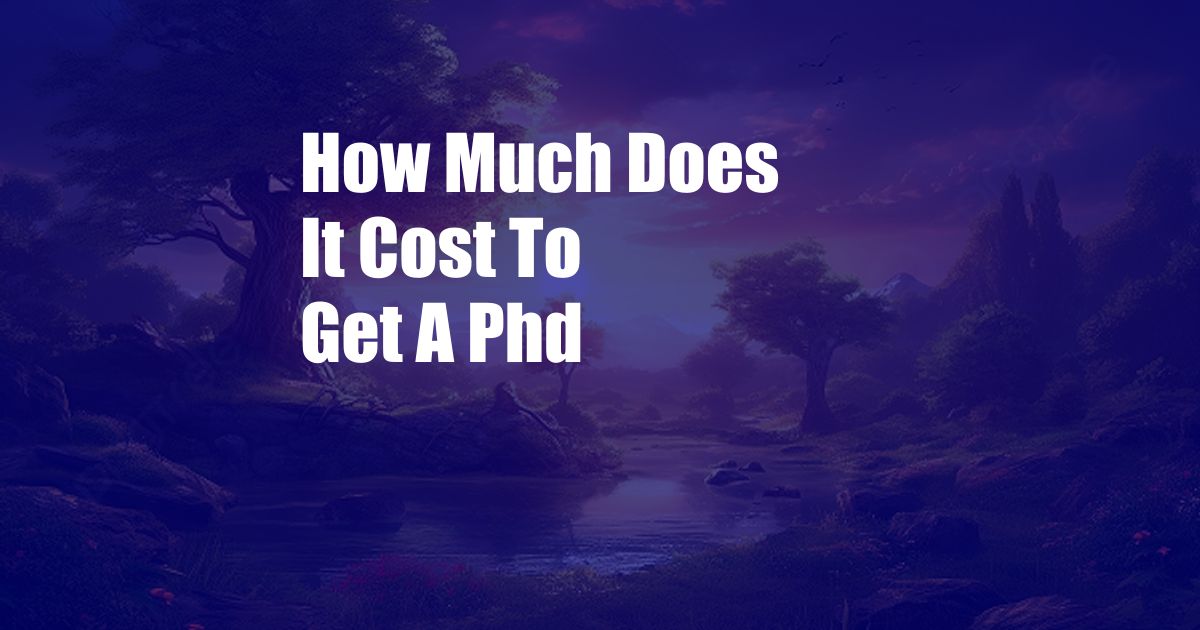
How Much Does It Cost to Get a PhD?
Obtaining a PhD degree is a significant investment both financially and intellectually. The costs associated with pursuing a doctorate can vary depending on several factors, including the university, program, and field of study. In this article, we will break down the expenses you may encounter while pursuing a PhD and provide tips to help you navigate the financial aspects of your academic journey.
As a PhD student, I faced the financial challenges that come with pursuing higher education. With careful planning and budgeting, I was able to manage the expenses and focus on my research. My experience has taught me that financial preparedness is crucial for a successful PhD journey.
Understanding the Costs of a PhD
The total cost of a PhD program can range from $30,000 to over $100,000, depending on university, program, and duration of study. Here are the key expenses you should consider:
- Tuition and Fees: The largest expense is typically tuition, which can vary significantly depending on the university and program. Fees may also include application fees, graduation fees, and other administrative costs.
- Living Expenses: This includes rent or mortgage, utilities, groceries, transportation, and other living expenses associated with living near the university. The cost of living can vary depending on the location of the university.
- Health Insurance: Health insurance is often required for students and may be provided by the university or purchased separately.
- Research Expenses: Depending on the field of study, research costs may include travel to conferences, equipment, or materials.
- Other Expenses: Books, supplies, childcare, and other personal expenses may also contribute to the overall cost.
Tips for Saving Money on Your PhD
While pursuing a PhD can be expensive, there are ways to reduce the financial burden:
- Apply for Fellowships and Scholarships: Numerous fellowships and scholarships are available to PhD students. These awards can provide significant financial support and reduce tuition costs.
- Explore Teaching or Research Assistantships: Many universities offer teaching or research assistantships that provide a stipend and tuition remission to PhD students in exchange for their work.
- Negotiate Tuition Costs: Some universities may be willing to negotiate tuition costs based on financial need or academic merit.
- Choose an Affordable University: Consider the cost of living when selecting a university. Universities in smaller towns or less expensive regions may offer lower tuition and living expenses.
- Create a Budget and Stick to It: Carefully track your expenses and create a budget that allows you to prioritize essential costs while staying within your means.
FAQs on PhD Costs
Q: What is the average cost of a PhD?
A: The average cost of a PhD program in the United States ranges from $30,000 to over $100,000.
Q: What are the most expensive PhD programs?
A: PhD programs in fields such as medicine, law, and business tend to be more expensive due to higher tuition and associated research costs.
Q: How can I finance my PhD?
A: Fellowships, scholarships, teaching assistantships, and research assistantships are common ways to finance a PhD.
Q: Is it worth getting a PhD?
A: The value of a PhD depends on your career goals and field of study. For many professions, a PhD is essential for career advancement.
Q: How long does it take to get a PhD?
A: The typical time to complete a PhD program in the United States is 5-8 years, although this can vary depending on the program and field of study.
Conclusion
Pursuing a PhD is an investment in your future. While the financial costs can be significant, there are ways to mitigate expenses and make it more affordable. By understanding the costs involved, exploring financial aid options, and making wise financial decisions, you can embark on your PhD journey with confidence.
Are you interested in pursuing a PhD? Share your thoughts and questions in the comments below.